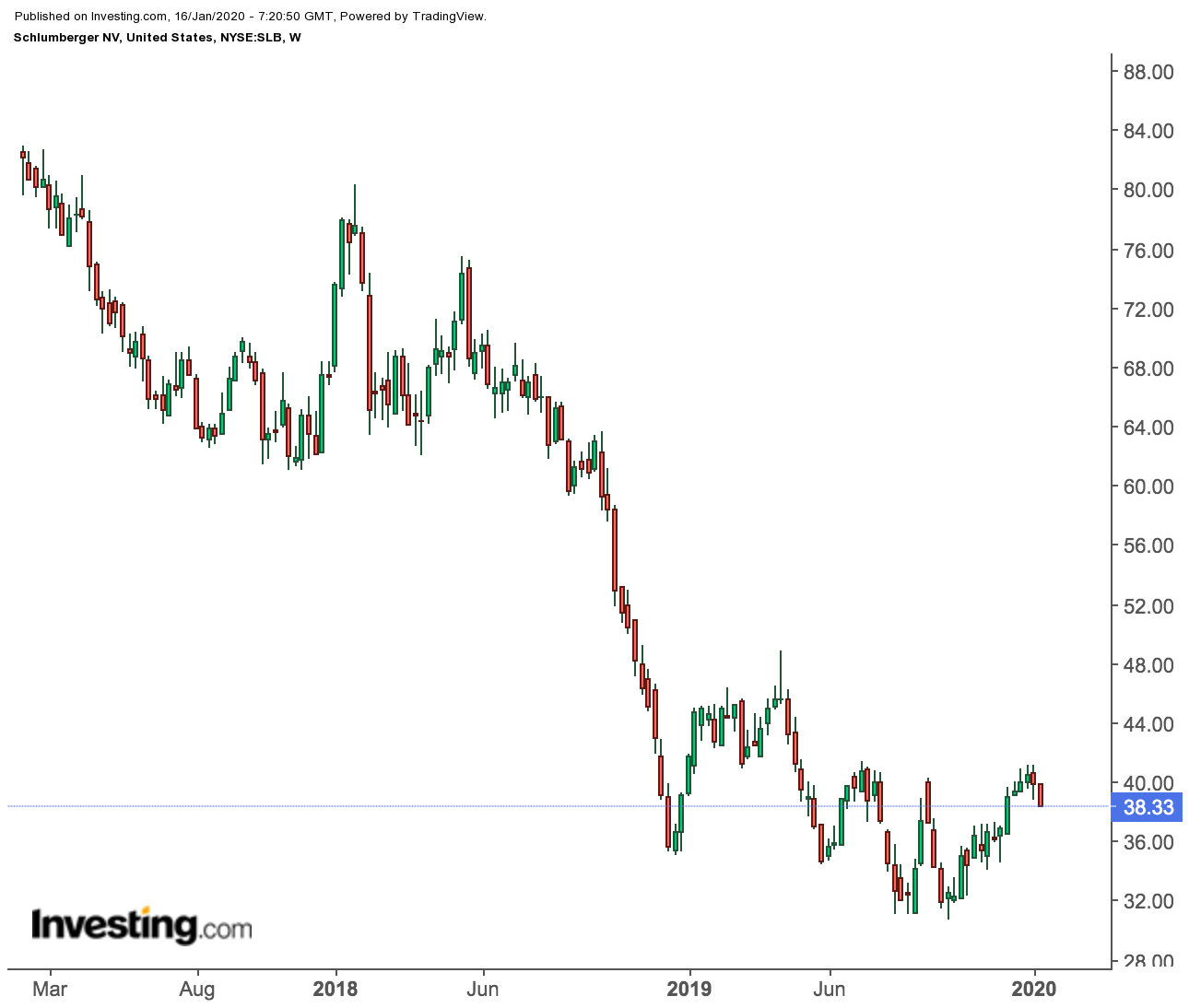- Reports 4Q 2019 results on Friday, Jan. 17, before the open
- Revenue Expectation: $8.17 billion
- EPS Expectation: $0.37
When Schlumberger (NYSE:SLB) reports its fourth-quarter earnings tomorrow, investors will be looking for some strong justification for the stock's 30% rally since October that halted a multiyear plunge.
The shares were down more than 3% on Wednesday, closing at $38.33, giving up some of the gains from the past quarter as oil prices continued their downward slide.
Despite the move higher this past quarter, the company has been stuck in a downturn since the middle of 2014. In the current environment where energy prices remain depressed, the world’s largest oil and gas producers have been reluctant to increase spending, thus thwarting the company's efforts to truly recover.
Schlumberger operates in more than 120 countries, supplying the industry's most comprehensive range of products and services, from exploration through production. Indeed, this behemoth's quarterly results serve as a bellwether for the energy business given its reach across regions and insight into drillers’ plans. Yet the world's largest oil services provider has seen its stock plunge more than 50% in the past five years.
The latest evidence of this tough operating environment came in October when Schlumberger reported its largest net quarterly loss in at least a decade after the company took $12.7 billion in pretax charges. This was its first since Chief Executive Officer Olivier Le Peuch took the reins in August and represented the new CEO’s strategy to clean the balance-sheet from the goodwill items that he could not justify.
Most of the charges — $8.8 billion — comprised writedowns on goodwill, the intangible assets on a corporate balance sheet that typically arises after the acquisition of another company. Schlumberger cited its 2010 purchase of Smith International Inc. and its takeover of Cameron International Corp. in 2016, as well as the subsequent deterioration in market conditions.
5% Dividend Yield
After the drastic correction in price, the shares looked cheap and some investors thought the bottom had been reached, especially with the company's 5% dividend yield in this low-rate environment. Despite the optimism that has supported Schlumberger's stock through the past quarter, we don’t yet see a growth catalyst on the horizon. Oil prices are sliding again and U.S. producers aren’t willing to spend.
Under pressure from shareholders, exploration and production companies are keeping spending in check, returning most of their free cash flow to shareholders in the shape of dividends and share buybacks.
Schlumberger itself isn’t shying away from admitting that reality. Last year, the company told analysts that it expects oil production from North American shale basins to slow as explorers cut spending after the recent wave of mergers and acquisitions and the move away from growth. In Q3, Schlumberger’s North American revenue declined 11% from the same period a year earlier, while climbing 8% in international markets.
Schlumberger’s business outside the U.S. and Canada is where the company generates most of its income. The oilfield services provider is forecasting single-digit growth for 2019, with explorers slated to boost spending as much as 8%.
The earnings potential for Schlumberger internationally is about four times that of its competitors when considering its larger market share and operating margin. But betting on its global growth is also risky. Many large oil producing nations are in pain and keeping their supplies under check because of fears of a global supply glut. We don’t expect that situation to change anytime soon, and hence see no near-term upside for Schlumberger stock.
Bottom Line
The shares of oil services companies have become cheaper after a precipitous decline in the past five years. But despite their more attractive valuations, we don’t think the time has come to snap up their shares. In this uncertain global economic and geopolitical environment, oil prices may not remain higher sustainably. It would be better for investors to avoid entering this trade now.
